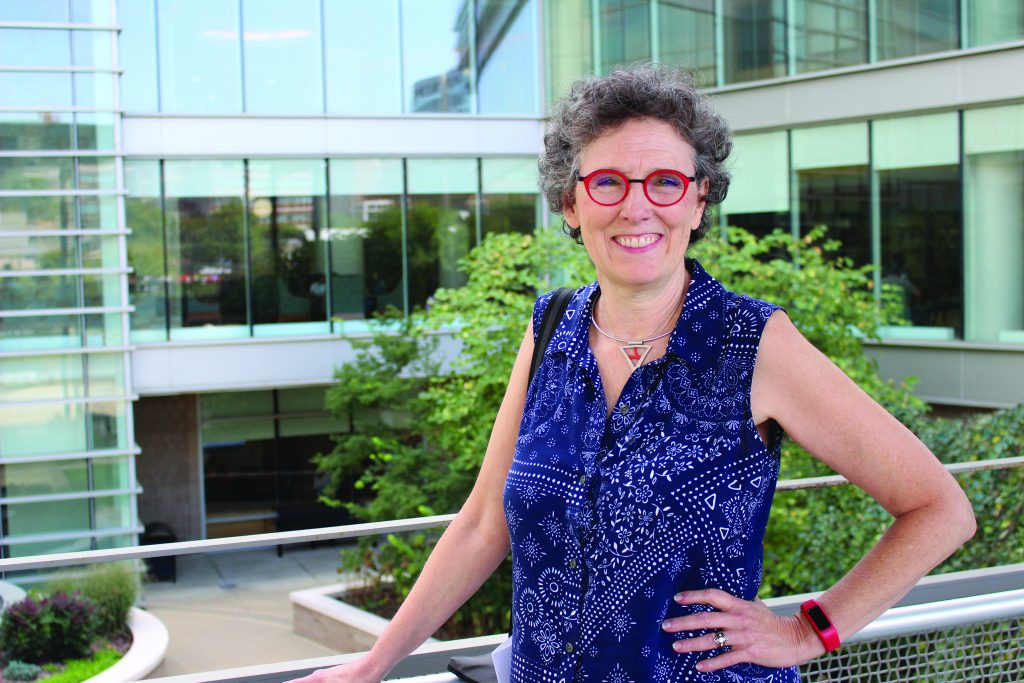A breast cancer diagnosis in 2014 was just the beginning of a long road to recovery but also self-discovery for Caterri Woodrum, now 58. Woodrum spent a year undergoing surgeries, chemotherapy and radiation for her triple negative breast cancer. In 2016, a surprising colon cancer diagnosis started the process all over again.

Today, Woodrum is cancer-free and credits the care she received at the North Carolina Cancer Hospital, the clinical home of UNC Lineberger, with a re-entry into the health care industry. But the support of her family and friends was also a game-changer for Woodrum, along with a family phrase that kept her going during the treatment phase — “suck it up, and be a Marine.”
Staying strong
Woodrum’s family members had service backgrounds in different branches of the military, something they used to help her get through surgery, treatments and follow-up care. Her father knew about her “be a Marine” phrase and gifted her with a Marine field jacket, complete with medals and ribbons honoring milestones in her cancer journey.
“I would wear it to my office when days were tough,” she said. “It was a coping mechanism to remind me that I could get through this and survive. Breast cancer treatment is difficult. You’ve got to deal with loss of hair, deal with wigs, scarves, and be a professional. People would know (by the Marine jacket) that it was a tough day, and they’d be supportive.”
A new direction
Formerly holding executive positions at the N.C. Museum of Art and the art museum’s foundation, Woodrum is a creative type, but she also spent more than a decade in the pharmaceutical industry. She was an executive and self-professed workaholic, checking email constantly, postponing vacations and taking work home with her. Since her diagnoses, though, she’s made major changes to her life, leaving her position at the museum and focusing instead on health care and health coaching.
“The experience left me on the other side saying ‘why didn’t I stay in health care?’ ” she said. “It was a life-changing event all the way around and made me stop and smell the roses, take stock.” Woodrum is now a national board certified health and wellness coach helping others navigate the health care system. She recently accepted the position of executive director and CEO for the Autoimmune Encephalitis Alliance, a national nonprofit headquartered in Durham, North Carolina, devoted to patient advocacy and disease awareness of autoimmune encephalitis. She said her health coaching credentials will come in handy in this role.
Collaborative patient care
Being on the clinical patient side of the health care industry was eye-opening for Woodrum, but it helped her appreciate the top-notch care and collaboration from her team, UNC Lineberger’s Lisa Carey, MD, FASCO, the Richardson and Marilyn Jacobs Preyer Distinguished Professor in Breast Cancer Research, David Ollila, MD, the James and Jesse Millis Distinguished Professor of Surgery, Lawrence Marks, MD, FASCO, the Sidney K. Simon distinguished Professor of Oncology Research, Autumn McRee, MD, director of GI clinical trials program and Karyn Stitzenberg, MD, MPH, FACS.
“I have faith in the people here. Lisa works with Autumn, they are both aware of what’s going on with me,” Woodrum said. “The coordination is phenomenal. You get the feeling that they know you, know your quirks, what you’ll be difficult about.” In fact, Woodrum praised the entire care team, from her chemotherapy nurses and radiation techs to the friendly and supportive parking attendants.
Family support, and survivorship
Having a great team at the hospital was important to Woodrum’s physical health, but it was her family and friends that helped keep her mentally healthy and her spirits high, particularly when facing surgery and treatments that are hard on the body.
“I thought ‘this is just another rite of passage. You’ll get through it, and after doing so you will realize you can face anything; you won’t be afraid of anything,’ ” she said.
Faith also played a role in helping her through the tough times. “My faith in God is very strong. I think that leaning on your faith is key to having hope and confidence. It’s all part of the attitude of getting through a tough situation,” she said. “It’s a disease. It’s not a death knell. Yes, it can be terminal, but so can a lot of other things.”
Woodrum hopes to bring that positive attitude to those struggling with cancer and other health conditions through her work with the Autoimmune Encephalitis Alliance. She said she wants to emphasize that survival is not an impossibility.
“ ‘Fighting cancer,’ sounds a little strange, but it’s how you feel; you’re under attack, and it feels like a battle,” she said. “Humanizing this fight where people recognize that cancer is something you live through – ‘live through’ being the operative phrase – is the critical objective. Not everyone will win this battle, and that’s the hardest part.”
For Woodrum, cancer survivorship is just as important as the surgery and treatments she went through on her cancer journey. She has reached the five-year survivorship milestone for her breast cancer and is three years into follow-up care for her colon cancer, something she hopes to mark with five years soon.
“People say ‘it must have been tough,’ but in a bizarre way, it was truly a blessing,” she said. “It turns your attention to what’s important. There’s life after it. It’s a robust and happy life.”
